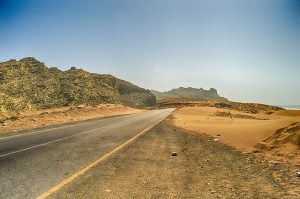Pakistan’s border with Iran has always been a porous one. There are no major mountain ranges or complex river systems separating the two countries and the Balochistan region, which straddles both nations, is largely dry and arid. For most of their shared history, ancient Persian kings, Mughal emperors, and Safavid shahs traversed the common border, spreading Persian influence beyond the Indus river into modern day Pakistan and India. Despite its porous nature, this border, combined with regional disputes and a complex system of alliances, could act as a barrier to Islamabad’s relationship with Tehran. However, a closer analysis of the situation reveals that despite frequent clashes along the border, Pakistan-Iran relations can continue to grow.
In the wake of an attack against Pakistani military personnel close to the Iran-Pakistan border that killed six Pakistani soldiers last month, the country’s army chief, General Qamar Bajwa, urged his Iranian counterpart, General Mohammad Hossein Bagheri, to take action against local militias operating in Iran, which he blamed them for carrying out the attack. While it is possible to detect frustration in Bajwa’s tone, both sides concluded their call by pledging to work together. They also vowed to enhance security along their common border. This pledge is nothing new. Last year, Pakistan and Iran agreed to form a Joint Rapid Reaction Force. The aim of the force is to coordinate border security and ensure neither country can be used as a base for insurgents, particularly local militias in Balochistan, which have been running a long campaign for independence from both Pakistan and Iran.
Despite their common cultural heritage, Pakistan and Iran have had different aims in the region. In the mid-1990s, Iran supported the Northern Alliance, a confederation of ethnic Uzbek, Tajik, and other groups in Afghanistan, while Pakistan backed the Taliban, led by tribal chief Mullah Omar. Furthermore, Iran’s close ties with India, including its economic links with New Delhi and joint infrastructure projects, have always hampered efforts to deepen relations with Islamabad. In addition, the general system of alliances across South, Central, and West Asia is complex and dynamic. Unfortunately for Pakistan and Iran, they always seem to end up on opposite sides of the table. Iran’s close ties to Russia and India, combined with Iran’s friendly relationship with Armenia (just last month, both countries were discussing the importance of a new power line connecting the two nations), place it squarely at odds with Pakistan’s regional policy in Central and West Asia, which centers on close ties with Turkey and Azerbaijan (which has a long standing territorial dispute with Armenia over the Nagorno-Karabakh region).
Why is it then that despite these geopolitical differences, the killing of six Pakistani soldiers, and frequent issues on both sides of the border, the Pakistani military are continuing to adopt a conciliatory tone toward Iran and are keen to talk about “common” security?
The answer could lie in a surprising announcement made late last year. In August 2019, the Indian government under Prime Minister Narendra Modi revoked Article 370, a special article that allowed Kashmir certain freedoms and significant autonomy. Naturally, India’s actions sparked outrage in Pakistan and across the wider Muslim world. Iran’s supreme religious leader, Ayatollah Khamenei, issued a surprisingly strong statement against India, condemning what he called the “oppression and bullying of Muslims in the region.” While Khamenei did mention Iran and India’s close relationship, his stinging rebuke of Modi’s actions were music to Islamabad’s ears, particularly given that Iran has frequently maintained a delicate balancing act between Pakistan and India over Kashmir.
Furthermore, Iran’s economic relationship with India isn’t all it seems. Despite both countries jointly developing the Chabahar Port on the Persian Gulf and a simultaneous network of rail links in southern Iran, bilateral trade between the two has fallen markedly, with some estimates suggesting it has dropped by almost 80 percent between April and November 2019. India’s warming relationship with the United States, Iran’s enemy, is also acting as a barrier to Indo-Iranian relations. Perhaps this complex web of factors could explain why Iran was so willing to condemn India’s revocation of Article 370 and why the Pakistani military, including Bajwa, are still talking about common ground and shared aims.
People-to-people contacts between the two countries have also continued to grow, with significant numbers of Pakistani Shia pilgrims travelling to Iran. In addition, three Iranian airlines operate direct flights to Pakistan. It is also important to recognize the importance of this relationship for the wider region. Iran and Pakistan could use their relationship to mediate in regional conflicts. Iran’s ties to Armenia and Russia, and Pakistan’s close relationship with Azerbaijan and Turkey, mean both countries are well placed to mediate between Yerevan and Baku over the long-standing Nagorno-Karabakh issue. Both nations also have an important role to play in ensuring stability in neighboring Afghanistan. Recently, Islamabad and Tehran, alongside Moscow and Beijing, expressed their desire to see a negotiated settlement between the Afghan government and the Taliban, while also pledging to provide medical assistance to Afghanistan in the wake of the coronavirus pandemic.
In essence, the Pakistan-Iran relationship is both complex and important. The attack on Pakistani military personnel in Balochistan and Pakistan’s attempts to build bridges with Iran must be viewed against a backdrop of recent events, including Khamenei’s criticism of India over Article 370. Whilst the physical border may no longer be able to facilitate the exchange of ideas and influences, perhaps officials from both sides can continue to strengthen an important relationship between two countries that straddle Asia and the Middle East.
Shahid Hussain is an incoming Ph.D. student at University College London (UCL).

































